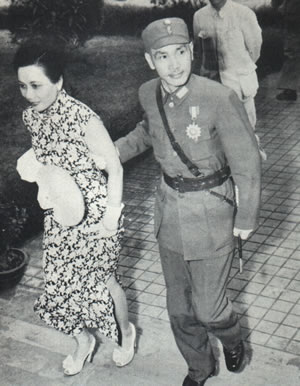Notes from The Challenge of Red China
by
Gunther Stein
For The U.S. War Against Asia
by William P. Meyers
Also sponsored by Peace Pins
Popular pages:
| U.S. War Against Asia |
| Fascism |
| Barack Obama |
| Democratic Party |
| Republican Party |
| Natural Liberation |
Page 4 of 5
 The medical system is covered. Despite the inability to import medicine and supplies, which are blockaded by the Nationalists, they have an extensive hospital system. They have to make their own equipment: “I saw instrument sterilizers made of old gasoline cans, catgut containers used as test tubes …” They also had some equipment captured from the Japanese. “Every item in the huge pharmacopoeia of traditional Chinese herb medicine was clinically tested by modern medial standards through years of hard scientific work. Many useful ingredients were found.” They even had started factories to produce western medicines [p. 268-281]
The medical system is covered. Despite the inability to import medicine and supplies, which are blockaded by the Nationalists, they have an extensive hospital system. They have to make their own equipment: “I saw instrument sterilizers made of old gasoline cans, catgut containers used as test tubes …” They also had some equipment captured from the Japanese. “Every item in the huge pharmacopoeia of traditional Chinese herb medicine was clinically tested by modern medial standards through years of hard scientific work. Many useful ingredients were found.” They even had started factories to produce western medicines [p. 268-281]
Stein & the other journalists were introduced to people like Wu Pei-hsiao, whom the nationalists had said had been murdered by the communists. He also interviewed Chinese who had escaped from Chiang’s prison for suspected communists [p. 291-299].
There is a lot of detail about how the Red Army fights the Japanese, and how they are eager to work with the United States in that. There is no evidence they are being armed by the government of the USSR. Contrasts are made with the lack of fighting spirit among the nationalist troops and population. [p. 303-320]
“Tokyo’s pressure for political compromise with Chungking increased as time went on, and never stopped. Peace was only one of the alternative objectives the Japanese endeavored to achieve at various periods.” The maximum aim was a “Pan-Asiatic alliance against the Western powers.” Minimum aims included a partial armistice, “trade between Japanese- and Kuomintang-controlled China, and cooperation against the Chinese Communists between the Japanese, their puppets, and the Kuomintang.” They hoped to appeal to at least some groups within the Kuomintang. “It seems certain that Chiang Kai-shek himself never considered peace with the Japanese. But some around him did.” There were some Kuomintang generals and officials who cooperated in various ways with the Japanese-Chinese “puppet” government. “The remarkable relaxation of Chungking’s official propaganda against traitors like Wang Ching-wei and other puppets of former prominence in the Kuomintang—at a time when the propaganda campaign against the Chinese Communists was intensified—discouraged many patriots.” “Postal communications, the remittance of money, and actual travel between Japanese-held cities and Free China remained easy and only superficially controlled.” [p. 320-321]
“As time went on [after 1938] the Kuomintang armies deteriorated. From under-nourishment, because their maintenance was not backed up by the necessary reforms of Chungking’s economic and financial policies. From lack of military and especially offensive action …” But he says the Kuomintang army in 1943 showed “heroic efforts of the rank and file at several places.” [322]
